AHRQ Long COVID Care Network

The U.S. Department of Health and Human Services (HHS), through the Agency for Healthcare Research and Quality (AHRQ), announced nine grant awards of $1 million each for up to 5 years to support existing multidisciplinary Long COVID clinics across the country to expand access to comprehensive, coordinated, and person-centered care for people with Long COVID, particularly underserved, rural, vulnerable, and minority populations that are disproportionately impacted by the effects of Long COVID.
The grants are a first of their kind, designed to expand access and care, develop and implement new or improved care delivery models, foster best practices for Long COVID management, and support the primary care community in Long COVID education and management. This initiative is part of a whole-of-government effort by the Biden-Harris Administration to accelerate scientific progress and provide individuals with Long COVID the support and services they need. In addition, AHRQ has awarded a complementary contract to promote success and peer-to-peer learning of grantees through a learning community, evaluate overall success of the Long COVID initiative across grantees, and share initiative findings.
Read the Press Release here.
Since the original nine grants awards in September 2023, three new grants were awarded in July 2024 (University of Southern California, University of California San Francisco, and Johns Hopkins University). See below for more information about the grant awards.
What’s New
Focus on advancing Long COVID clinical care by AHRQ’s Long COVID Care Network grantees:
- Stanford University’s Long COVID Care REACH Program is hosting a webinar titled "Unraveling Long COVID Care: Clinical Advances & Future Directions" on May 29, 2025, from 9:00 am to 1:00 pm Pacific Time.
- University of California Health provides a free continuing medical education course featuring a series of Long COVID modules: https://health.universityofcalifornia.edu/long-covid-education
- Washington University offers several resources for clinicians, including Long COVID diagnostic and management tools: https://stlouisihn.org/our-work/clinical-community-integration/long-covid-care/
Funding for New Grant Awards on Long COVID
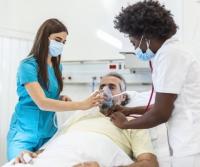
Keck CO-OP CAMP: Keck COVID Recovery Clinic, Optimal Outcomes for Patients in a Comprehensive Assessment and Management Program
Grant #: U18 HS029950-01
Principal Investigator: Caitlin McAuley, DO
Institution: University of Southern California, Los Angeles, CA
Description: The COVID Recovery Clinic at Keck Medicine (Keck CRC) of the University of Southern California has treated patients with Long COVID since 2020. In this project, Keck CRC will improve its current care delivery and symptom model, establish new models of service to expand services to more patients, create multidisciplinary education resources for healthcare providers, and collect and analyze standardized data on patient and clinic outcomes to inform ongoing modifications in care delivery. Read full profile (PDF, 192 KB).
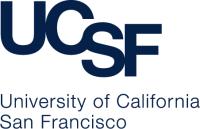
Broadening the Scale and Impact of a Comprehensive Long COVID Clinic to Serve Diverse Patient Groups With Multidisciplinary Care and Research Access
Grant #: U18 HS029951-01
Principal Investigators: Lekshmi Santhosh, MD; Vivek Jain, MD; Michael Peluso, MD.
Institution: University of California, San Francisco, San Francisco, CA
Description: The central goal of this project is to improve capacity, access, and equity for underserved, vulnerable, and minority populations being served by the University of California, San Francisco Long COVID OPTIMAL clinic program. Using an implementation science approach and leveraging the existing OPTIMAL Long COVID care model and established relationships with community and research, this project will: (1) scale up Long COVID care in the San Francisco Bay Area to increase access for underserved, vulnerable, and minority populations; (2) enhance Long COVID care coordination and communication across clinical, research, and community settings; and (3) identify key barriers and facilitators to implementation success and sustainability of the expanded and enhanced Long COVID care model. Read full profile (PDF, 216 KB).
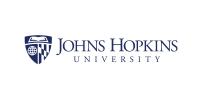
Supporting Patients Recovering from COVID (SPaRC)
Grant #: U18 HS029937-01
Principal Investigator: Ann Parker, MD, PhD
Institution: Johns Hopkins University, Baltimore, MD
Description: This project will build upon the existing multidisciplinary Johns Hopkins Post-Acute COVID-19 Team outpatient program to expand essential clinical services and facilitate patient-centered, equitable care delivery for people living with Long COVID, especially those from underserved communities. SPaRC will build a coalition to strengthen collaboration with, and support for, primary care providers. The SPaRC program will be evaluated using a mixed methods approach and iteratively refined within a learning health system in collaboration with the SPaRC Stakeholder Advisory Council and the AHRQ Learning Community to advance Long COVID care. Read full profile (PDF, 208 KB).
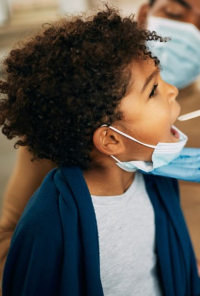
Mid-Atlantic Pediatric Long COVID Network: Implementing Patient-Centered and Multi-Disciplinary Practices to Improve Pediatric Long COVID
Grant #: U18 HS29920-01
Principal Investigator: Laura Malone, MD
Institution: Kennedy Krieger Institute, Baltimore, MD
Description: This project will expand clinic services and capacity for children with Long COVID by identifying barriers, adapting the clinic to provide resources to mitigate these barriers, and educating primary care providers and community partners on the diagnosis, care, and management of pediatric Long COVID. The primary goals of this project include expanding and strengthening the services of the Pediatric Post-COVID-19 Rehabilitation Clinic at the Kennedy Krieger Institute and developing and delivering provider education on Long COVID in children through an 8- to 10-course series. Ultimately, this project seeks to establish a network of community providers across Maryland and the Mid-Atlantic region that can treat pediatric Long COVID early and effectively, providing greater access to care in vulnerable pediatric populations. Read full profile (PDF, 285 KB).

The Pitt IMProving Access to Culturally relevant Long COVID care and Treatment (IMPACCT) Program
Grant #: U18 HS29924-01
Principal Investigators: Alison Morris, MD, MS; Frank Sciurba, MD; Howard B. Degenholtz, PhD
Institution: University of Pittsburgh, Pittsburgh, PA
Description: This project will train the next generation of community providers in Long COVID care and improve access to primary and specialty care for Long COVID patients from underserved and rural populations. They will do this by expanding healthcare provider capacity through the development of comprehensive, culturally informed educational materials and targeted outreach programs; providing expanded and equitable access to specialized Long COVID care; and establishing a dedicated support group, a knowledge-sharing platform, and providing patient resources for self-management. All programs will be developed in partnership with the Black Equity Coalition, a Black-led group of physicians, researchers, epidemiologists, public health experts, community funders, and government officials. Read full profile (PDF, 167 KB).
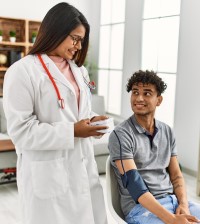
Comprehensive Long COVID Care for Underserved Communities: Innovative Delivery and Dissemination Models (Comunidad)
Grant #: U18 HS29947-01
Principal Investigators: Monica Verduzco-Gutierrez, MD; Lisa Kilpela, PhD; Joel Tsevat, MD
Institution: University of Texas Health Science Center, San Antonio, TX
Description: This project will improve and expand Long COVID care in San Antonio and South Texas, and will test new, sustainable models of care through a 5-year program. They will do this by expanding holistic, multidisciplinary care at University of Texas Health Sciences Center, San Antonio; collaborating with community providers on best practices for basic Long COVID evaluation and management; and partnering with the community to disseminate up-to-date information about Long COVID among the largely Hispanic/Latino, rural South Texas communities. Read full profile (PDF, 184 KB).

Improving Access to Multidisciplinary Care for Patients with Long COVID
Grant #: U18 HS29905-01
Principal Investigators: Janna L. Friedly, MD, MPH; Jessica Anne Bender, MD; Nikki Gentile, MD, PhD
Institution: University of Washington, Seattle, WA
Description: This project will expand the existing University of Washington Long COVID clinic to improve access and coordination of care, specifically for patients in rural communities and in Latino, Native American, and Southeast Asian communities in Washington and Alaska. They will do this by improving clinical care delivery and expanding access to the Long COVID clinic; engaging underserved communities to enhance Long COVID education and connection to local resources; and improving patient access in the region by training a network of clinicians specializing in Long COVID care. Read full profile (PDF, 194 KB).
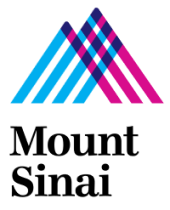
Primary Care-Integrated Long COVID Care to Improve Outcomes for Minoritized Adults in New York City
Grant #: U18 HS29945-01
Principal Investigators: Juan Wisnivesky, MD, DrPH; Alex Federman, MD, MPH; Zijian Chen, MD
Institution: Icahn School of Medicine at Mount Sinai, New York, NY
Description: This project will add a third site to the Mount Sinai Center for Post-COVID care in East Harlem, serving minority and low-income residents. In addition, the team will create clinical decision pathways to guide clinicians through the evaluation and care of Long COVID patients and embed the pathways in electronic medical records (EMR). They will also develop the Long COVID knowledge and clinical skills of the primary care physicians, train them to use the EMR-embedded clinical decision support tool, and provide them access to Long COVID specialist e-consults and referrals so that they can manage Long COVID patients of low complexity. Read full profile (PDF, 190 KB).

The Atlanta Long COVID Collaborative: A Multi-Health System Long COVID Coordinated Care Model Serving a Diverse Metropolitan Population
Grant #: U18 HS29944-01
Principal Investigator(s): Tiffany Walker, MD; Jenny Han, MD; Alexander Truong, MD
Institution: Emory University, Atlanta, GA
Description: This project aims to increase access to care, improve person-centered care coordination, and expand multidisciplinary networks and behavioral health support in the metro Atlanta area. This will be achieved by: (1) expanding in-person and virtual visit capacity and increasing provider-based referrals through a coordinated education series; (2) adding dedicated care coordination, social services, and language interpretive staff; (3) expanding the existing Long COVID-specific subspecialty network and establishing multidisciplinary case conferences to improve collaboration and expedited care of complex cases; (4) integrating dedicated behavioral health staff and implementing behavioral health and rehabilitation group series; and (5) engaging community support systems including patient advocacy groups and community alliances. Read full profile (PDF, 171 KB).

Novel Statewide Response to Post-COVID Care Delivery
Grant #: U18 HS29943-01
Principal Investigators: Sarah Jolley, MD; Donald Nease, MD
Institution: University of Colorado, Denver, CO
Description: This project will implement the Colorado Multidisciplinary Translation Network (CO-MTN), which is comprised of integrated, multidisciplinary Long COVID care clinics and primary care clinics working together in a tiered care delivery pathway. They will measure the effect of CO-MTN on (1) reach of Long COVID care to Colorado patients, specifically those described as underserved, and (2) effectiveness on reducing Long COVID symptom burden and severity for patients. They will also assess the effect of CO-MTN on (1) adoption of the CO-MTN tiered care delivery model by primary care clinics and physicians within these clinics, (2) implementation of the tiered care pathway, and (3) maintenance of the tiered care pathway key components past the active project period. Read full profile (PDF, 158 KB).
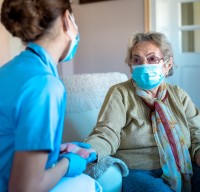
Long COVID Care Resources and Education to Advance Community Health (REACH)
Grant #: U18 HS29930-01
Principal Investigators: Upinder Singh, MD; Linda Geng, MD, PhD; Hector Bonilla, MD
Institution: Stanford University, Stanford, CA
Description: This project will implement the Long COVID Care Resources and Education to Advance Community Health (REACH) care model, a centrally-coordinated, multidisciplinary Long COVID hub program that supports and partners with safety-net Federally Qualified Health Centers (FQHCs) in the community to expand and improve the care of vulnerable patient populations suffering from Long COVID. They seek to improve community awareness and education on Long COVID for patients and clinicians; support primary care providers in partner safety-net FQHCs by creating a collaborative learning community with peer-to-peer asynchronous and real-time consultation; and improve Long COVID care referral coordination and access at the Stanford hub clinic. Read full profile (PDF, 190 KB).

Advancing Long COVID Care in Our Community through Access, Equity, and Collaboration
Grant #: U18 HS29911-01
Principal Investigators: Abby Cheng, MD; Jonas Marschall, MD; Amy McQueen, PhD
Institution: Washington University in St. Louis, St. Louis, MO
Description: This project aims to transform an existing, university-based Long COVID clinic into a broader Long COVID community network to expand equitable access to care, improve the patient care experience, and support primary care practitioners. This project will invest in two particularly underserved populations: the Black community in St. Louis, Missouri, and rural communities across Missouri. The grantee seeks to expand equitable access to Long COVID care by building clinical capacity and removing structural barriers to care; improve the Long COVID care experience by streamlining care that crosses multiple disciplines and physical care sites and supporting patients' social needs; and support primary care teams as they care for patients with Long COVID by co-creating educational resources and streamlined communication and referral pathways between primary care practitioners and specialty clinicians. Read full profile (PDF, 161 KB).



